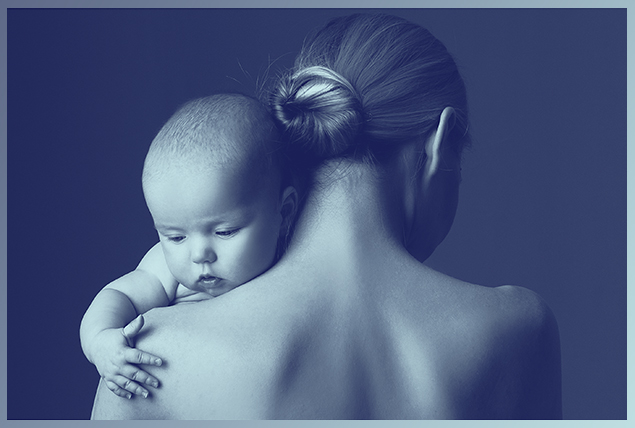How Do You Connect With Your Baby After Surrogacy?

Key Points
- Connecting with their baby born through surrogacy can be difficult for some parents.
- It's important to remember this can be normal, though. There's no specific timeframe in which this bond "needs" to happen.
- Bond with your baby before birth. Practice skin-to-skin contact. Even postpartum-induced lactation can help.
After a successful surrogacy, intended parents get to soak up all the newborn goodness with their new baby, but it's common for some parents to struggle to connect emotionally and bond after surrogacy. Here's what can help.
Is it normal to feel detached from my baby after a surrogacy?
"Strong parent-child bonds may not happen immediately with everyone," said Kecia Gaither, M.D., board-certified in OB-GYN and maternal-fetal medicine and the director of perinatal services/maternal-fetal medicine at NYC Health + Hospitals/Lincoln in the Bronx in New York City. "An emotional transfer may take time. There is no time set in stone."
One reason parents may not bond with their baby right away is due to stress, according to Anna Cabeca, D.O., a Dallas-based OB-GYN and owner of The Girlfriend Doctor.
"The baby senses that and responds to the mom's emotions, and in turn will get nervous and anxious as well—creating this vicious circle of anxious communication," Cabeca said.
Parents' mindset around surrogacy could interfere with their bonding experience, too, said Georgia Witkin, Ph.D., a clinical psychologist and the director of psychological services and wellness at RMA of New York.
For instance, if the parent believes the baby is the gestational carrier's child or feels that not carrying the baby makes them less of a parent, it could make it more challenging for them to bond with the baby.
How long it takes for a parent to bond with their baby after surrogacy is individual, so it's important to be patient and practice compassion.
"For some women, it's instantaneous, and for others, it may take weeks or even months," Cabeca said.
Recommended
- What to Consider When Searching for a Surrogate: Consider several factors as you look for the perfect person to carry your child.
- How Surrogacy Can Work for You: If you want to become a parent but struggle to conceive, surrogacy could be worth considering.
- My Surrogate Helped Me Move On With My Life After Breast Cancer: Unable to get pregnant while in remission, I turned to surrogacy—and received more than a baby.
How can I bond with my baby after surrogacy?
Experts encourage parents to try many ways of bonding with a baby after surrogacy. This bonding process can begin long before the baby is born, when the baby is in the gestational surrogate's womb.
Get involved in the pregnancy and with the gestational carrier's prenatal care, Gaither said. Talk to the baby while they are in utero so they hear your voice and get to know your voice. Create an audio recording of your voice that the surrogate can play when you're not there.
Once the baby is born, skin-to-skin contact is a great way to bond.
"Hold the baby near your heartbeat," Cabeca said. "Let him/her get used to your scent, your voice, your touch, your cuddles. There are a lot of nonverbal, hormonal and intuitive exchanges that happen at those very early stages that have a massive impact on establishing the mother-child bond."
Whether or not the baby was born via surrogate, doing all these things soothes the baby and stimulates a positive response in the parent, Witkin said.
Some women try postpartum-induced lactation, allowing the biological mother to breastfeed their baby.
"I would work with a physician who is knowledgeable in inducing lactation and can support the mom in her desire to breastfeed her baby," Cabeca said.
How do you know you are bonding with your baby?
The baby will let you know if the bonding efforts are working.
"They'll smile at you, latch on to your finger or a toy you two usually play with," Cabeca said. "[They] will stop crying when they hear your voice or at least calm down and cry less."
You'll feel stronger emotions when you're with your baby, too. Practice infant massage. Make eye contact with your baby and don't forget to smile.
"And if they're fully in trust mode, they will fall asleep on you very deeply, totally surrendering to you, as if your chest and arms are the safest place on Earth, and it is the most precious sentiment of all," Cabeca said.
Can you 'spoil' a baby by responding too quickly?
"When it comes to babies, especially infants, who are totally at the mercy of the adults around them, you cannot spoil them by responding to all of their cries," Cabeca said. "This is when they establish a sense of reliability and dependency and trust, which is crucial for the mental, emotional and physical development of the child."
In other words, don't worry about spoiling a baby when you're trying to build a bond. Once the child begins to speak and understand, then, Cabeca said, it is important to introduce healthy boundaries.
Can you experience postpartum depression (PPD) after surrogacy?
The surrogate gestational carrier can experience symptoms of postpartum depression (PPD), Gaither said. The biological mother may have symptoms of depression after surrogacy.
Even men can experience postpartum depression.
Many of the contributing factors to PPD aren't biological but are regular, common stressors, according to American Surrogacy.
The bottom line
If you don't feel an instant bond with your baby born via surrogate, remember this is common. There is no set timeline for when it "should" happen.
Bond with your new baby by choosing skin-to-skin contact, talking and singing to your baby, and letting your infant get to know your scent to help strengthen your emotional ties.


















